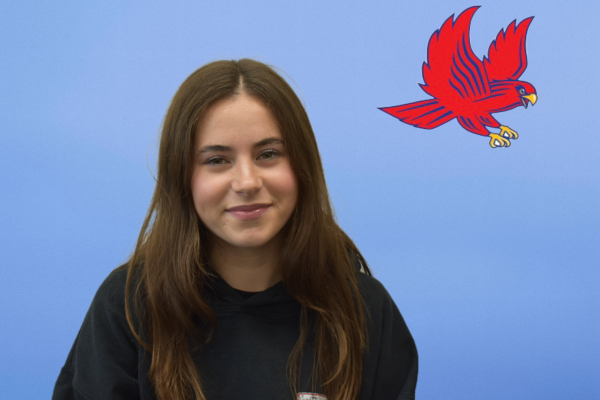Angel Reese and Caitlin Clark: The Double Standard in Women’s Sports
Contrary to what the media portrays, long-time competitors Caitlin Clark and Angel Reese have expressed great amounts of respect for each other off the court.
April 19, 2023
This year, the Women’s NCAA March Madness final received more recognition than ever before, shattering viewership records as millions of people across the country tuned in to watch Louisiana State University face off against the University of Iowa.
But despite the fact that these women were breaking records left and right, the majority of the post-game attention generated from the media was not surrounding the outstanding victory and the accomplishments it brought with it; in fact, it was a hailstorm of criticism and outrage.
There are two names in particular circulating across most social media platforms and news sites that are critical to the backstory: Louisiana’s Angel Reese and Iowa’s Caitlin Clark. Even before things went downhill, people were talking about these two women, as both are captains of their respective teams and had exuded their dominance and talent throughout the tournament.
However, in the final seconds of the game they were thrown into the spotlight for all the wrong reasons.
Prior to playing Louisiana State in an Elite Eight game against Louisville, Caitlin Clark displayed a gesture coined by John Cena where she waved her hand in front of her face, otherwise known as the “You Can’t See Me” gesture. It’s considered somewhat of a taunt within the sports world, but Clark was praised by many, and John Cena himself voiced his support on Twitter for her method of celebration. She had just dropped 41 points to send her team to the Final Four; no one thought anything of it.
However, in the concluding moments of the final game, Angel Reese repeated the gesture in front of Caitlin Clark, clearly directing it at her as a form of both gloating and celebrating her team’s victory.
The world didn’t react quite so lightly this time.
Reese was immediately vilified across every platform. Sports commentator Keith Olbermann as well as Dave Portnoy, founder of Barstool Sports, both tweeted profanities that voiced that Reese’s use of the gesture was “classless,” a word that was quickly trending in regard to her actions. People were outraged, and the discrepancy was blatant — Reese’s use of the gesture was viewed as disrespectful and unsportsmanlike, while Clark’s use was gutsy and admirable. And while Reese’s version of the taunt was undoubtedly more directed and prolonged, many people, including herself, felt that the backlash was due to the fact that Reese is Black and Clark is white, and because Reese didn’t fit the same narrative as Clark did, her actions were not as well received.
While the Twitter war raged on and people continued to fan the flames of the controversy, one thing became incredibly clear to me: there is a huge double standard between our expectations for female athletes and their male counterparts.
Within the world of male sports, we favor that kind of behavior: it shows grit, tenacity, and passion, making the game far more entertaining. Rarely are male athletes told to tone it down or play nice — and why should they be? Trash-talking, gloating, celebrations; they all bring the game to life. As long as no harm is occurring, there’s no reason why athletes should ever have to curb their competitiveness. So why are male athletes constantly being praised for the same things that female athletes are being raked over the coals for?
Consistently, women are dubbed as too emotional for showing any signs of competitiveness within their sport.
We’ve seen the same scenario play out over and over again. Alex Morgan, member of the USWNT, was slammed for her celebration against England in the World Cup semi-final and again when the team beat Thailand 13-0 in the group stage, deemed unsportsmanlike in both situations. Meanwhile, male soccer players around the world such as Cristiano Ronaldo are famous for their signature celebrations and are never criticized for displaying them.
After being accused of cheating, Serena Williams received incredible amounts of backlash when she broke her racket and talked back to the umpire, and was eventually fined $17,000. Roger Federer, a male tennis player of similar rank to Serena, repeated similar actions out of outrage in the 2009 US Open, but was greeted with more sympathy and understanding and was only fined $1,500.
The world is finally starting to adjust to the idea that women are just as capable of dominating the sports world, but we’re not giving them opportunities to celebrate their successes or express their disappointment. In fact, in situations such as these, we often attempt to pit women against each other so that they prevent themselves from celebrating their successes.
People were quick to come to Caitlin Clark’s defense, painting her as a victim of disrespect who was deeply wounded and deserved an apology, but we’re not giving them the credit they deserve. Are we forgetting that these are two grown women participating in the highest level of their sport? Caitlin Clark doesn’t need — or want — an apology, and Angel Reese doesn’t owe her one. If this were a men’s game, people probably wouldn’t be angry in the first place, and they certainly wouldn’t feel the need to come to the other person’s defense and act like they aren’t capable of handling a little trash talk. Both of these women have expressed great amounts of respect for each other, and both acknowledged that the gestures and the trash-talking are all part of the game.
Society needs to take a page out of their book and do the same.
By imploding over this issue, we managed to generate enough unnecessary conflict and animosity to distract us from the real successes of the game. So, if you were one of the people caught up in the whirlwind of blame and outrage (which, granted, was not easy to avoid), here’s what you missed.
The 2023 Women’s March Madness Final was the most watched sporting event on ESPN+ ever. Caitlin Clark scored 191 points throughout her run, the most in any single NCAA tournament — men’s or women’s. She also set the record for most assists in a women’s tournament (60), most points in any tournament semi-final (41), most 3s in a championship game (8), and was the first player in March Madness history to have back to back 40-point games as well as attain a 40-point triple-double (10 or more points, assists, and rebounds in one game).
Angel Reese had 34 double-doubles (reaching double-digits in two of the five categories: points, rebounds, assists, steals and blocks), setting the record for the most in any single season. She also helped lead her team to break records for most points scored in a single half of a semi-final or championship game (59), most points scored overall in a semi-final or championship game since 1982 (102), first team women’s Final Four team to reach triple-digit points, and the highest 3-point field-goal percentage in championship game history (65%).
These are the things we should be celebrating and talking about. At the end of the day, it’s not Angel Reese vs. Caitlin Clark — it’s about what they were able to accomplish together as two incredibly talented and successful female athletes.





